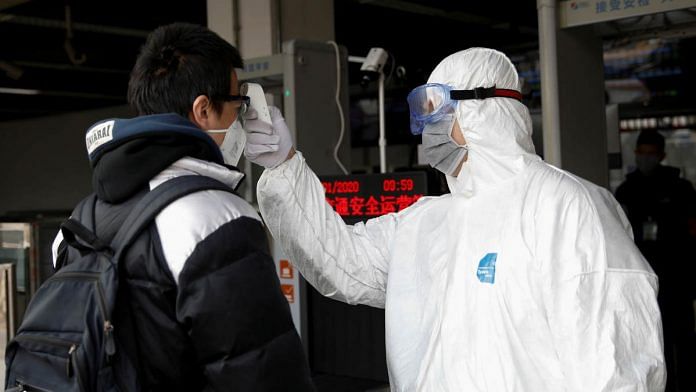New Delhi: With the death toll in the coronavirus outbreak crossing 213, the World Health Organization (WHO) Friday declared it a global health emergency.
WHO chief Dr Tedros Adhanom Ghebreyesus, who made the announcement at a press conference, said the main reason for the declaration is not “what is happening in China but what is happening in other countries”.
A global health emergency, or Public Health Emergency of International Concern (PHEIC) as it is officially known, is declared when “some serious public health events can endanger international public health”.
WHO has formally defined it as “an extraordinary event which is determined to constitute a public health risk to other States through the international spread of disease and to potentially require a coordinated international response”.
According to a report in The New York Times, nearly 9,800 people have been affected. While a vast majority of them are in China, 98 cases have been confirmed in 18 other countries.
“Thailand and Japan have each reported 14 cases of infection; Hong Kong and Singapore have 10; Taiwan has eight; Australia, Malaysia and Macau each have seven; France and the United States have six; South Korea, Germany and the United Arab Emirates each have four; Canada has three; Vietnam and Italy each have two; and India, the Philippines, Nepal, Cambodia, Sri Lanka and Finland each have one,” the report adds.
Also read: This new coronavirus test can speed patient screening and spread of disease
The sixth global health emergency
The coronavirus outbreak is the sixth such to be declared a PHEIC in WHO’s history. The previous five instances of global health emergency include the swine flu outbreak in 2009 that claimed over 2,00,000 lives, the Ebola outbreak in 2014 and 2019 that led to 11,000 deaths in West Africa, a polio outbreak in 2014 and the Zika outbreak in South America in 2016.
The declaration of a global health emergency gives the WHO’s director-general the powers to give temporary recommendations to countries that could help them curb the spread of the infection. A PHEIC is typically declared to mobilise and consolidate international response to an outbreak.
“These (the temporary recommendations) are non-binding but practically & politically significant measures that can address travel, trade, quarantine, screening, treatment. WHO can also set global standards of practice,” WHO tweeted Friday.
What does Public Health Emergency of Intl Concern means?
WHO issues temporary recommendations. These are non-binding but practically & politically significant measures that can address travel, trade, quarantine, screening, treatment. WHO can also set global standards of practice
— World Health Organization (WHO) (@WHO) January 30, 2020
WHO’s health emergency management framework
The recommendations that follow the declaration of a global health emergency are determined as per the circumstances of the outbreak. However, the international body does list certain guidelines for countries to follow under the International Health Regulations (2005).
These may include “the requirement to carry out medical examinations and vaccinations, to place suspect persons under public health observation, to quarantine, isolate or require the contact tracing of contacts of affected persons, to carry out exit screening, and to refuse entry to suspect or affected persons”.
The guidelines also specify that a country’s laws and emergency plans have to take cognisance of these international obligations.
“The director-general shall consider health measures that are neither more restrictive of international traffic,” reads a WHO document on PHEIC procedures.
In the case of the coronavirus outbreak as well, the WHO has advised countries not to unnecessarily restrict travel and trade to China, and support nations with weaker health systems.
Also read: What we know of coronavirus so far, and how Modi govt is monitoring it in India



